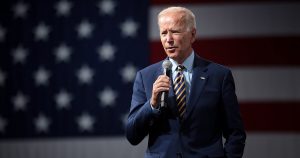Since Joe Biden became the 46th president of the United States on January 20, there has been a real risk that his policies would be weighed – unfairly perhaps – against lofty expectations, not the least because of the circumstances leading up to it. After Donald Trump’s term in office and pursuit of a foreign policy that seemed to mirror his personality, Biden’s exhortations about bringing liberal values back to the U.S. foreign policy discourse seemed appealing to many, including those who felt that U.S. interests and values around the world closely track each other – and that the tradeoffs in pursuing the two are not as big as imagined.
As Biden settles into office, and his foreign policy begins to be evident — in terms of revealed preferences rather than rhetorical commitments – it is now likely that a degree of dissatisfaction is inevitable as compulsions born out of realpolitik, the stickiness of long-set strategic objectives, as well as fundamental limitations of U.S. power, all collude to put Biden on the path of more of the same.
Two recent data points support this claim.
First, the Biden administration has chosen to walk down an extremely odd path when it comes to Saudi Arabia, and especially the kingdom’s “reformist” Crown Prince Mohammed bin Salman. First, it chose to declassify a U.S. intelligence assessment that bin Salman had approved of a mission to “kill or capture” Saudi journalist Jamal Khashoggi in Istanbul in October 2018. While Trump refused to pin the blame on bin Salman – and dispatched his son-in-law Jared Kushner to pal around with the crown prince as part of a quixotic plan to fix the Middle East – Biden’s decision to publicly put out the intelligence establishment’s assessment was definitely a step in the right direction.
What followed, however, was less hopeful: A tepid response amounting to a free pass to the millennial autocrat. A March 3 CNN story quoted two administration officials as saying that sanctioning bin Salman for his role in the gruesome murder of Khashoggi (which, in case you forgot, involved bone saws) was “too complicated” a proposition. The reason: the United States’ military interests in the region, of course. Setting aside for the moment that it is quite unclear what those interests specifically are – beyond effectively meddling in millennia-old, irresolvable disputes or some nebulous desire to not cede strategic space to adversaries – such a line of thinking also belies the hope that under Biden the United States could decisively pivot to the Indo-Pacific militarily. More importantly, expectations that the U.S. could cut itself loose from legacy conflicts – or resist the urge to be drawn into newer ones – in the region that drain strategic energy and attention now stand seriously challenged.
Many will also choose to contrast the Biden administration’s response to the bin Salman episode to its (justifiably direct) response to the Kremlin’s attempt to murder Russian dissident Alexei Navalny. On March 2, the Biden administration announced sanctions against seven Russian officials and added 14 Russian entities to the Department of Commerce’s Entity List, along with other measures. Now juxtapose these actions against inaction in the case of bin Salman, and you can’t help ending feeling that Biden’s administration too is not immune to the same pull that fixed foreign policy orbits of the ones before it.
The end effect, and lesson many around the world — including putative partners of the United States — could draw from the sorry bin Salman saga is that as long as U.S. continues to tilt at strategic windmills, it provides a fairly broad window for them to pursue odious policies free of consequence.
Second, the Biden administration has struggled to develop a concrete set of tools that could make the Myanmar junta reassess the cost-benefit calculations in continuing to stay in power following the February 1 coup. Yes, it has announced sanctions; but as Queen Mary University of London scholar Lee Jones assessed in a new Diplomat Risk Intelligence report, the sanctions are unlikely to make the slightest dent in the Tatmadaw’s plans. Yes, Washington has made suitable noise about the junta’s actions, but a cloistered military with no real ties to significant Western powers is unlikely to be bothered by it.
Of course, despite calls by some that if violence against protesters in Myanmar continues unabated, U.S. and allied military intervention may become a necessity, Biden is unlikely to walk down that path for obvious reasons: China is unlikely to be greatly pleased about it (and the U.S. is likely to fret about China’s potential reaction to that contingency secretly), and the U.S. public, battered by the pandemic and exhausting fruitless wars, are unlikely to be very welcoming of such a move. Additionally, U.S. partner and Myanmar’s neighbor India is equally unlikely to see U.S. boots to its immediate east as something that it could live with gladly. Meanwhile, it has become evident that the U.S. has had little success in persuading New Delhi to exert pressure on the Tatmadaw.
So here we are then, as Biden rolled into his second month in the White House: the U.S. remains prisoner of the same constraints, many of them self-created, as before. The elemental reality of power politics once again threatens to lay bare the chasm between U.S. rhetoric and actions. And the United States government once again realizes that the basket of options in front of it when it comes to shaping events across the world is increasingly shrinking.
In other words, America is truly back.

































